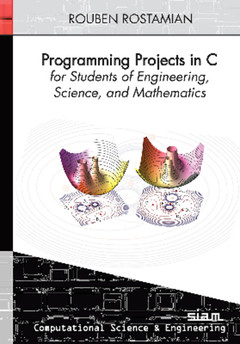Description
Programming Projects in C for Students of Engineering, Science, and Mathematics
Author: Rostamian Rouben
Language: English
Subject for Programming Projects in C for Students of Engineering...:
Publication date: 10-2014
400 p. · 17.6x25.2 cm · Paperback
Withdrawn from sale
400 p. · 17.6x25.2 cm · Paperback
Withdrawn from sale
Description
/li>Contents
/li>Biography
/li>
Written as a tutorial on how to think about, organise and implement programs in scientific computing, this book achieves its goal through an eclectic and wide-ranging collection of projects. Each project presents a problem and an algorithm for solving it, and the reader is guided through the process of implementing the algorithm in C, and compiling and testing the results. The projects contain suggested algorithms and partially completed programs for implementing them, written in platform-independent standard C, to enable the reader to develop and exercise skills in scientific computing. Requiring only a working knowledge of undergraduate multivariable calculus, differential equations, linear algebra and the C programming language, this book is written for graduate students in mathematics, engineering and the sciences. It will also be of interest to advanced undergraduates and working professionals who wish to hone their skills in scientific computing in C.
Chapter interdependencies; Preface; Part I. A Common Background: 1. Introduction; 2. File organization; 3. Streams and the Unix shell; 4. Pointers and arrays; 5. From strings to numbers; 6. Make; Part II. Projects: 7. Allocating memory: xmalloc(); 8. Dynamic memory allocation for vectors and matrices: array.h; 9. Reading lines: fetch_lines(); 10. Generating random numbers; 11. Storing sparse matrices; 12. Sparse systems: the UMFPACK library; 13. Haar wavelets; 14. Image I/O; 15. Image analysis; 16. Linked lists; 17. The evolution of species; 18. The Nelder–Mead downhill simplex; 19. Trusses; 20. Finite difference schemes for the heat equation in one dimension; 21. The porous medium equation; 22. Gaussian quadrature; 23. Triangulation with the Triangle library; 24. Integration on triangles; 25. Finite elements; 26. Finite elements: nonzero boundary data; A. Barycentric coordinates; Bibliography; Index.
Rouben Rostamian is a Professor of Mathematics at University of Maryland, Baltimore County (UMBC), where he has been since 1985. Over the years he has served as Department Chair at UMBC and as Program Director of the Applied Mathematics Program at the National Science Foundation. He has published numerous articles on the analysis of linear and nonlinear partial differential equations with applications to homogenization, flow in porous media, elasticity, and computational mathematics.
© 2024 LAVOISIER S.A.S.

